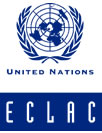| «Back |
| Multimedia presentations |
Day 1: Wednesday, 09 December
| 14.00 - 14.15 |
Inauguration: Public policies for equality and the Agenda 2030 |
|
| Antonio Prado, Deputy Executive Secretary, ECLAC |
 |
| Laís Abramo, Director, Social Development Division, ECLAC |
 |
| 14.15 - 14.40 |
The Trilogy of Equality and the Agenda 2030
Antonio Prado, Deputy Executive Secretary, ECLAC |
 |
| 14.40 - 16.00 |
Session 1: Towards universal social protection: Latin American pathways and policy tools
The objective of this session is to present the new toolkit of policy and programme options for social protection systems and discuss key approaches, policies and programmes to expand coverage and reduce inequalities.
Moderator: Verónica Amarante, Director, ECLAC Office in Montevideo |
|
| The rights-based approach to social protection, Simone Cecchini, Social Development Division, ECLAC |
 |
| Models of development and the welfare State matrix, Fernando Filgueira, Independent Consultant |
|
| Social protection along the life cycle, Cecilia Rossel, Social and Political Science Department of the Catholic University, Uruguay |
 |
| Financing and investment for social protection, Rodrigo Martínez, Social Development Division, ECLAC |
 |
| Building compacts for social protection, Carlos Maldonado, Social Development Division, ECLAC |
 |
| Discussion |
|
| 16.20 - 18.00 |
Session 2: Public policies for greater equality: SDG Targets 10.1- 10.4
The objective of this session is to present and discuss what has been learned so far and the knowledge gaps existing on SDG target 10.4 “Adopt policies, especially fiscal, wage and social protection policies, and progressively achieve greater equality”.
Moderator: Simone Cecchini, Social Development Division, ECLAC
|
|
| Employment and decent work promotion, Laís Abramo, Director, Social Development Division, ECLAC |
 |
| Public policies for gender equality, Nieves Rico, Director, Gender Affairs Division, ECLAC |
 |
| Distributive impact of the 2014 tax reform in Chile, Alberto Arenas, Economic Development Division, ECLAC |
 |
| Methodological considerations on the redistributive impact of fiscal policies and social investment, Varinia Tromben, Social Development Division, ECLAC |
 |
| Discussion |
|
Day 2: Thursday, December 10
| 09.00 - 10.50 |
Session 3: Public policies for greater equality: Latin American and Caribbean experiences
The objective of this session is to discuss the lessons learned in Latin America and the Caribbean with respect to productive development policies, labour policies, social protection and green taxation
Moderator: Laís Abramo, Director, Social Development Division, ECLAC
|
|
| Structural change and development with equality, Gabriel Porcile, Productive Development Division, ECLAC |
 |
| Labour markets and structural heterogeneity: Public policies for inclusive development, Ricardo Infante, ECLAC |
|
| Estimating the impact of monetary transfers for children and older persons, Fernando Filgueira, independent consultant |
 |
| Green fiscal policies, Allan Beltran, Sustainable Development and Human Settlements Division, ECLAC |
 |
| The contribution of the Progresando con Solidaridad programme to greater social equality, Altagracia Suriel, Director General, Prosoli, Dominican Republic |
 |
| Discussion |
|
| 11.10 - 13.00 |
Session 4: Public policies for greater equality: Inter-regional experiences
The objective of this session is to discuss the lessons learned in the ECA, ESCAP and ESCWA regions with respect to social protection, labour, and fiscal policies
Moderator: Amr Nour, Director, Regional Commissions New York Office, United Nations
|
|
| Public policies for greater equality: Lessons learned in the ECA region, Saurabh Sinha, Chief, Employment and Social Protection Section, ECA |
 |
| Social protection: Lessons learned in the ESCAP region, Patrik Andersson, Chief, Social Integration Section, ESCAP |
 |
| Public policies for greater equality: Lessons learned in the ESCWA region, Oussama Safa, Chief, Participation and Social Justice, ESCWA |
 |
| The welfare mix in Arab countries and its implications for equity and equality, Gisela Nauk, Chief, Inclusive Social Development, ESCWA |
 |
| Discussion |
|
| 13.00 - 14.30 |
Lunch |
|
| 14.30 - 16.40 |
Session 5: Measurement of socio-economic inequalities and the Agenda 2030
The objective of this session is to present and discuss the proposed indicators to monitor targets 10.1 – 10.4 as well as new and alternative ways of measuring inequalities, with experiences from Latin America and the Caribbean
Moderator: Cecilia Rossel, Social and Political Science Department of the Catholic University, Uruguay |
|
| Indicators to monitor income inequality, target 10.1 and 10.2, Marco Galván, Statistics Division, ECLAC |
 |
| Analysing the indicator to monitor target 10.3, Pablo Villatorio, Statistics Division, ECLAC |
 |
| Alternative measures of inequality, Verónica Amarante, Director, ECLAC Office in Montevideo |
 |
| Measuring top incomes, Juan Pablo Jimenez, Economic Development Division, ECLAC |
 |
| Measuring racial and ethnic inequalities through household surveys, Vivian Milosavlievjc, Social Development Division, ECLAC |
 |
| Discussion |
|
| 17.00 - 18.00 |
Session 6: Measurement of socio-economic inequalities: Lessons from the UNECE region
The objective of this session is to discuss the lessons learned in the UNECE region with respect to the measurement of socio-economic inequalities.
Moderator: Patrik Andersson, Chief, Social Integration Section, ESCAP
|
|
| Poverty measurement in the UNECE region, Andres Vikat, Chief of Social and Demographic Statistics, UNECE |
 |
| The Moldovan experience in the measurement of inequalities, Veronica Nica, National Bureau of Statistics, Republic of Moldova |
 |
| Discussion |
|
| Wrap-up and closing remarks |
|
Format available
 |
: PDF presentations. |
 |
: PDF speeches. |
«Back |

